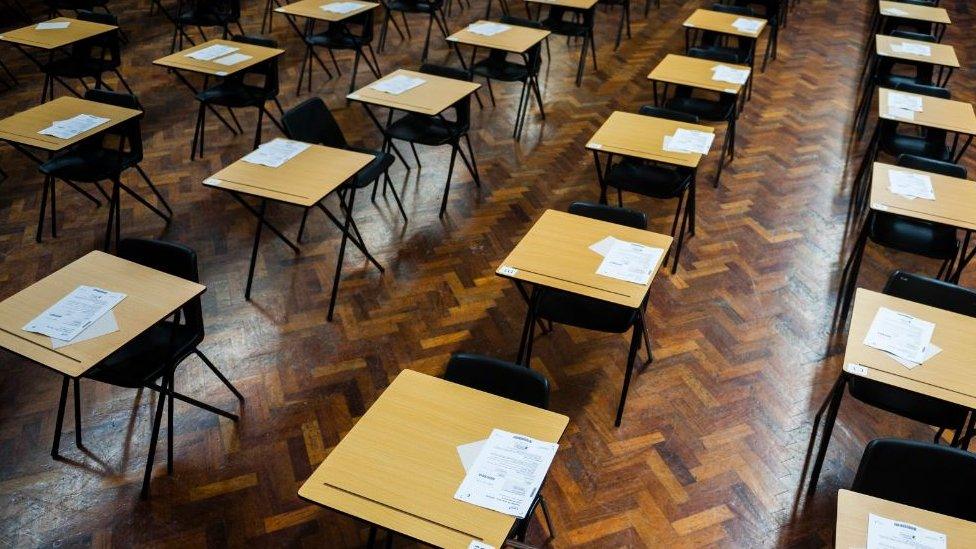Covid-19: Stormont ministers explain need for tighter rules
- Published
- comments
Breaking coronavirus restrictions is like walking into a hospital and slapping a nurse in the face, says Robin Swann
Adhering to Covid-19 lockdown restrictions in Northern Ireland has "never mattered so much", First Minister Arlene Foster has said.
Her comment comes after the Stormont executive agreed to give police the power to enforce the stay-at-home order which takes effect on Friday.
The Police Federation said it was concerned about "gaps" in that law.
The UK has reported a further 1,041 people have died with coronavirus, the highest daily death toll since April.
Mrs Foster said ministers had not taken the step lightly and had done so "reluctantly".
Speaking in the Stormont assembly alongside Deputy First Minister Michelle O'Neill to explain their decisions, Mrs Foster said it was because Northern Ireland's health situation was "grave".
"We regret we have to put it in law because we're restricting freedoms and that is very regrettable," she said.
Northern Ireland is in the second week of a six-week lockdown, but on Tuesday ministers agreed schools should also move to remote learning until mid-February.
The tight restrictions are in place amid the rising number of coronavirus cases.
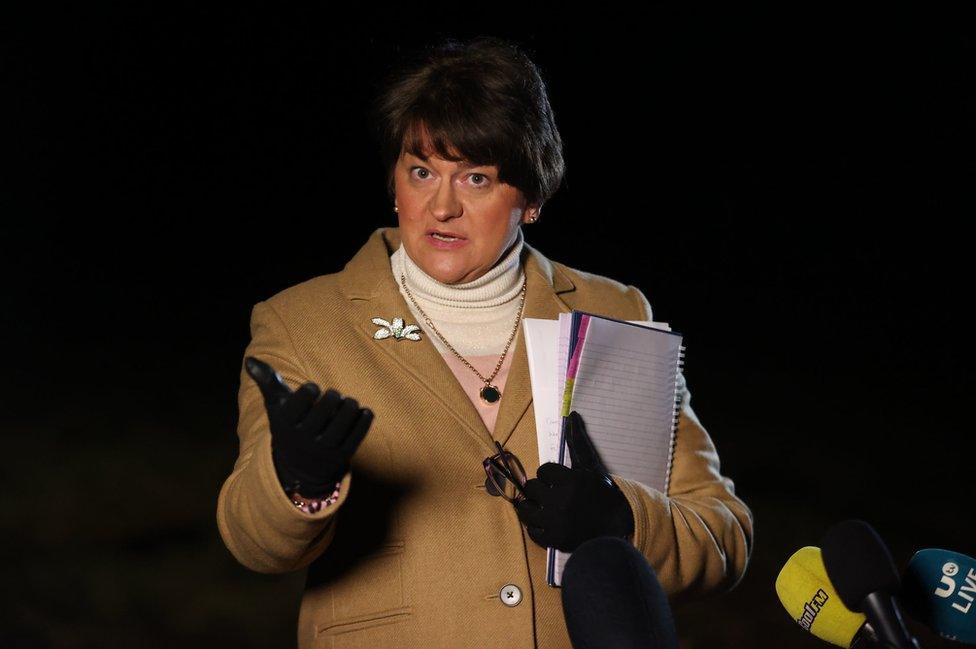
New, tighter restrictions are being imposed because the situation is grave, said Arlene Foster.
The reproductive rate of the virus is approximately 1.8 and hospitals are at full capacity.
Ms O'Neill said the escalation in positive cases presented a "real threat" to the health service and that people needed to be protected.
Health Minister Robin Swann hit out at those he said have been flouting the advice and rules.
"I wish those people ignoring the message would just stay at home out of the road, because what they do is akin to walking into any of our hospitals or ICU units and slapping a nurse in the face," he said.
"That's how I feel about those people who take these actions, who think they are either above what's happening or immune."
What are the tighter restrictions?
From Friday, people will only be allowed to leave home for medical or food needs, exercise and work that cannot be done from home.
The executive has also decided to reduce the number of people allowed to meet both indoors and outdoors.
Enforcement powers for the Police Service of Northern Ireland (PSNI) are to be reintroduced, meaning officers can order people to go home if they are breaking lockdown rules.
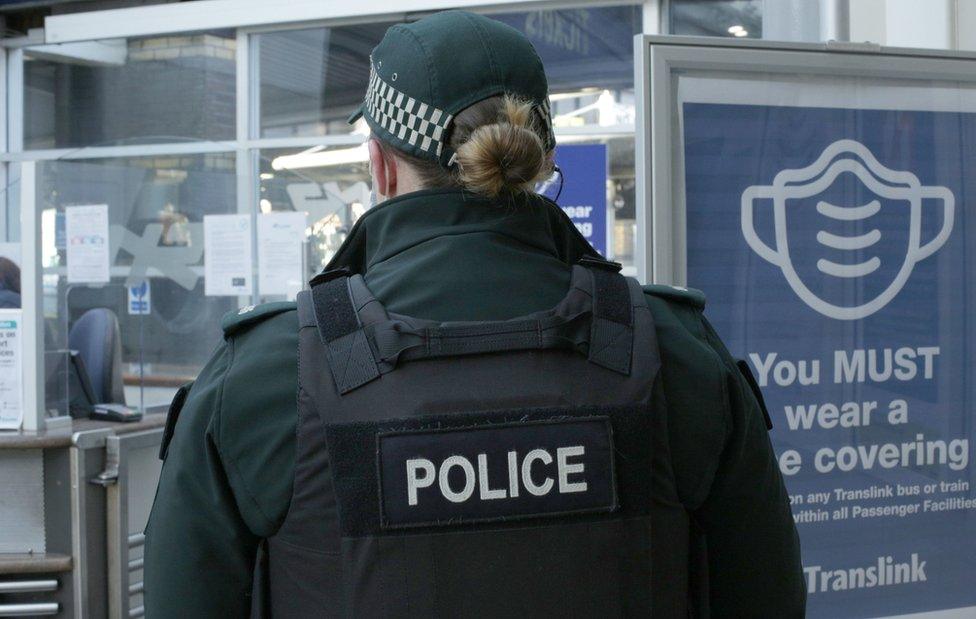
Police will have powers to enforce the tighter Covid-19 restrictions
Mark Lindsay, the chair of the Police Federation which represents rank-and-file officers, said he had questions about the executive's decision to reintroduce those powers and how comprehensive the legislation would be.
"There's a whole pile of gaps that the police are very much left to pick up the pieces on," he said.
"We don't think that's practical or fair."
The first and deputy first ministers said they would meet with the PSNI Chief Constable Simon Byrne to talk through the new powers.
" We know the PSNI will do everything they can to first engage and explain before turning to their powers," said Mrs Foster.
Justice Minister Naomi Long said the PSNI was operating in difficult circumstances, but she believed that they had acted "broadly proportionately" so far.
She said the executive had not moved to put into law a travel limit for exercise, but that they agreed to place in guidance that "people should not go more than 10 miles from their home to exercise".
Junior ministers are to meet church leaders "as soon as possible" to discuss closing places of worship and moving services online.
What is happening with exams and transfer tests?
Education Minister Peter Weir has confirmed that all GCSE, AS and A-level exams will not go ahead this year.
He also faced questions about school transfer tests after one exam provider cancelled its testing process, while another moved its test to next month.
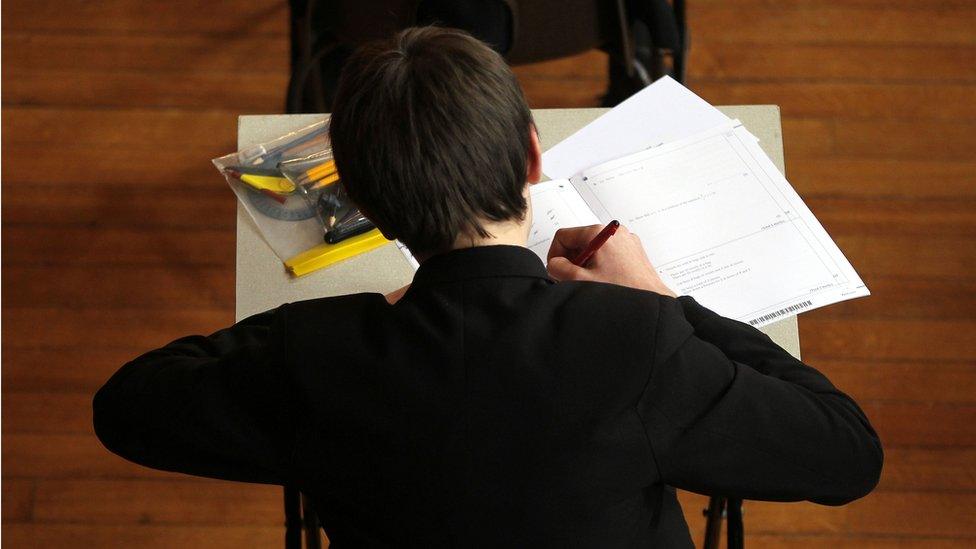
While the first transfer tests - used by the majority of Northern Ireland grammar schools to select pupils - were due to take place on Saturday but on Tuesday the exam providers said that would not happen.
One provider cancelled its test while another - the Association for Quality Education (AQE) - said it was moving its test to a single sitting in February.
Mr Weir said he did not have the power to intervene.
However, Deputy First Minister Michelle O'Neill outlined her opposition to the move by the AQE, saying it was "a private company putting its needs before the needs of the children".
She said Mr Weir "must act now" to stop the AQE test.
But the minister told the assembly that there was "no clear obvious way" for academic selection to take place without some form of test".
Whatever criteria is used in the absence of the transfer test would lead to a "problem of fairness", said Mr Weir.
Remote learning for school pupils is expected to last well into February, with most children not returning to classrooms until after the mid-term break.
Schools will admit vulnerable children and the children of key workers, and special schools will stay open.


'I was ready to do the test'
Londonderry schoolgirl Elidth Wild, 10, was putting in "several hours of work each week" doing practice exams papers in preparation for the transfer test.
"I have been working for ages now - I started working at the end of P5 and I was ready to do it on Saturday," Elidth told BBC Radio Foyle.
"I heard the test was cancelled and then just a while ago I heard that it was on and I felt confused.
"I feel like it's too long that I have been waiting to do this now."
Elidth's mum Gemma said the uncertainty about the test was "very stressful" for the family.
"We are a bit disappointed in the communication from the likes of the AQE and the grammar schools," she said.
"We haven't had any direct correspondence as of yet - nobody has come out and talked directly to the kids sitting [the exam] and they are the most important people."

Koulla Yiasouma, the commissioner for children and young people, said Tuesday was a "truly shameful day for education" in Northern Ireland.
She criticised the lateness of the decision-making on the transfer test and said she was "speechless" when the AQE announced it was rescheduling its test.
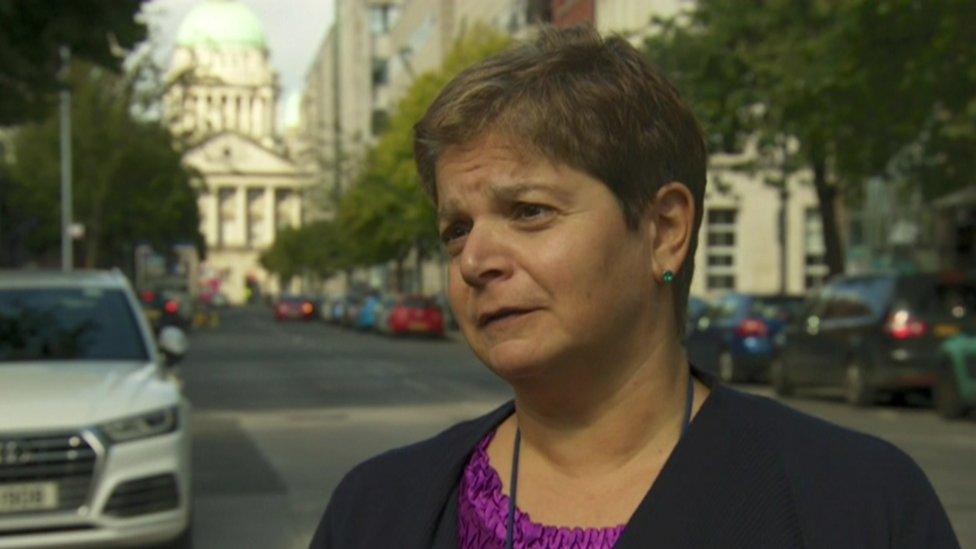
Koulla Yiasouma said it was "unconscionable" that children were having to deal with last-minute decisions about exams
"I absolutely understand the devastation that children and their parents and indeed their teachers feel with the announcements yesterday," she said.
The commissioner argued that because the pandemic is so unpredictable, AQE cannot guarantee that it will be safe enough to hold the postponed exam next month.
Ms Yiasouma objects in principal to academic selection at the ages of 10 and 11 but explained her current criticism was directed at the lack of clarity on transfer tests, GSCEs and BTec exams.
"It's unconscionable that we are doing this to our children and young people," she said.
- Published29 July 2021

- Published5 January 2021
